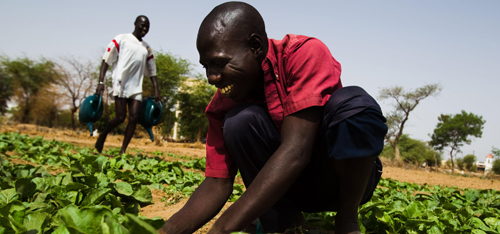Building food security in Senegal's Niayes and Casamance regions
A two-year project, entitled “Renforcement de la sécurité alimentaire dans les Niayes et la Casamance” (GCP/SEN/032/CAN), was launched in 2011 to improve food security in Senegal's Niayes and Casamance regions. The focus was on sustainably intensifying agricultural production and improving market access for smallholder farmers. Project activities comprised three main components: developing capacity of farmers and farmer organizations; providing technical assistance for enhanced and sustainable agricultural production; and fostering equitable marketing of agricultural products.
The project areas were selected based on their potential to increase production and generate income. The Niayes zone is particularly well suited for horticulture. Its proximity to Senegal's larger cities favours a market- and export-oriented method of production. The Casamance region has traditionally engaged in rainfed rice cultivation, yet low yields stemming from poor production practices, and lack of access to inputs and credit, have made this region particularly vulnerable to food insecurity. In the project areas of the Anambé basin, however, farmers are transitioning to irrigation-based production, which, if coupled with better management techniques, could increase both production and profitability.
The project developed capacity at all levels through the Integrated Production and Pest Management (IPPM) programme's existing farmer field school (FFS) network.
Sustainable intensification through IPPM / FFS activities
More than 828 men and 941 women participated in season-long FFS for vegetable or rice production. While the FFS curricula focused principally on improving agronomic practices to boost production, it also addressed issues related to commercialization and improved market linkages.
In order to provide participating farmers and communities with a more enabling production environment, committees were established in each partner organization, and were trained to manage:
- revolving funds for seed (24 tonnes of rice, 337 kg of vegetables) and fertilizer (organic and inorganic for a total of 772 tonnes); and
- small agricultural materials (carts, crates, etc.).
Efforts were made to involve women in the project as they play an essential role in agricultural production in the selected regions. Gender equity was favoured throughout the entire project cycle, from planning and implementation, to monitoring and evaluation.
Partners
FAO worked closely with various partners on this project, namely: the Ministry of Agriculture; Direction Régionale du Développement Rural de Thiès; local communities; non-governmental organizations; producers’ organizations; and Société de Développement de l’Agriculture.
FAO is grateful for the financial support provided by the Government of Canada.

